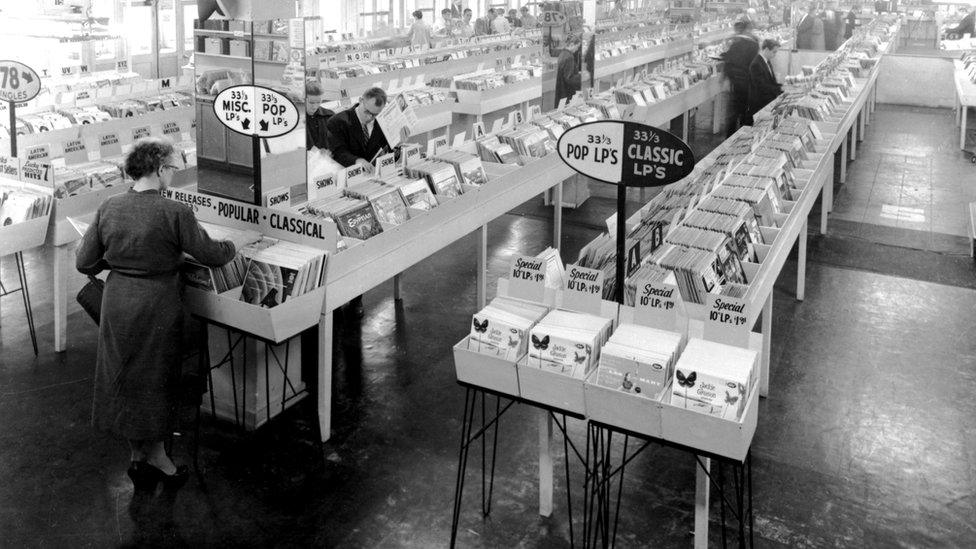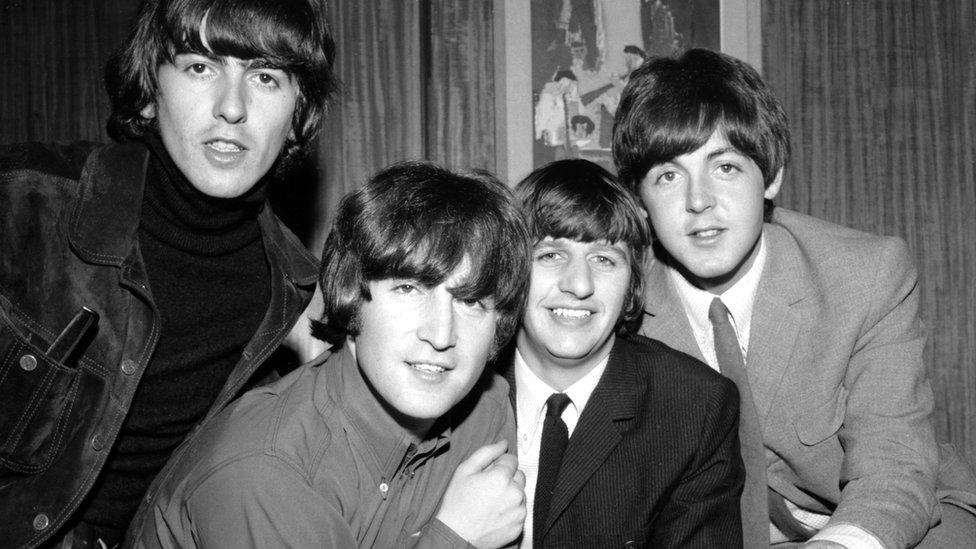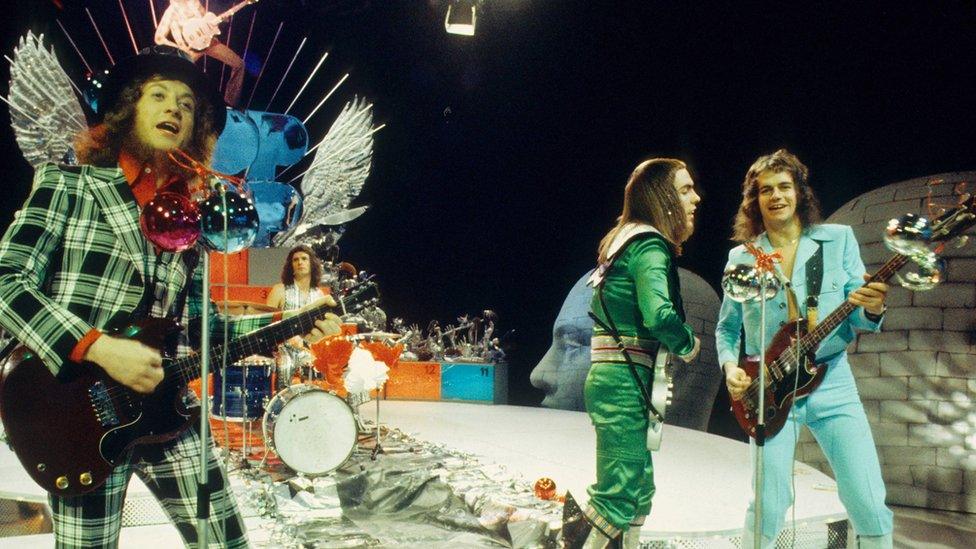Christmas number one: Why is the festive chart-topper such a big deal?
- Published
- comments

LadBaby (Mark and Roxanne Hoyle) with their Official Christmas Number 1 Award for I Love Sausage Rolls
It's almost time for the moment many music artists have been waiting for - the Christmas number one!
Each year, during the week of Christmas, one song is crowned king of the festive charts.
In fact, one song is named king of the charts - number one - every single week of the year.
But for one reason or another, everybody wants to get their hands on the prize during the Christmas week - and in 2020 the big prize is actually being awarded on Christmas Day itself!
Reigning champions are YouTuber Ladbaby who in 2019, or the second time on the trot, a feat only previously achieved by the Beatles and the Spice Girls!
Where did music charts come from?
The first UK music charts were published in the New Music Express on Friday, 14 November 1952.
It was a top 12 list, which was based on the sales from around just 20 record shops!
WATCH: Kids react to Christmas numbers ones from the past
By 1969, this had grown to around 250 shops and more than 12 songs on the list, but the charts relied on record shops posting punch cards with their sales. It was all done very differently back then.
In 1983, an organisation called Gallup took over control of the charts - but this time, they used computers. This meant they could process information from double the number of record shops - and faster - and the charts grew a huge deal.

This picture shows a record shop from around 1970. This used to be the only way that you could buy music, as downloading didn't exist like it does now
In the 1990s, buying music online became a factor in how the charts were worked out, as fewer people were going out and buying actual records in shops, which is how it always used to be done before the days of computers.
But that wasn't the end of the charts changing.
In 2017, it was announced that acts would only be allowed to have three songs in the chart at any one time, in order to help new bands to break through.
This was a result of big albums being played over and over again and artists nabbing all of the top spots in one go. (Ed Sheeran, we're looking at you... He had 16 tracks into the top 20 in March 2017!)
More recently, in June 2018, the Official Charts Company changed its rules one more time to include music video streams and downloads for the first time. This was after songs like Despacito were racking up billions of views online that weren't counting towards their chart positions.
Unofficial videos and fan-created content featuring the songs don't count, but official videos played on YouTube, Apple, Tidal and Spotify in the UK now do.
Where did Christmas number one come from?
The first Christmas number one that was written especially for the festive period was back in 1955, when Dickie Valentine's Christmas Alphabet bagged the top spot.
In the 1960s, it was the era of The Beatles and they won the Christmas crown in four years of that decade. In fact, The Beatles are still to this day the most successful band, having topped more Christmas charts than anyone else in history.
But it wasn't until the 1970s that the battle for Christmas number one really started.

The Beatles had a great run of Christmas number ones in the 1960s
At the time, glam rock was a big thing, with people dressed in big, over-the-top outfits with powerful songs.
But there were a lot of problems in society with issues like IRA bombings and threat of rationing petrol, and many people looked to music and glam rock to escape from these problems.
Two bands which were very famous at the time were Slade and Wizzard.
When they released their singles Merry Xmas Everybody and I Wish it Could Be Christmas Everyday in 1973, everyone went wild for them. (We still listen to these Christmas songs to this day!)

1973 was the year that the battle for Christmas number one was really born, when Slade (pictured here) went up against a band called Wizzard in a competition for the festive chart-topper
Fans of each band were desperate to see their group win the top spot, and the battle for Christmas number one really took off.
Slade took the crown - and, in fact, remained number one well into the following year. In a survey in 2007, their single Merry Xmas Everybody was actually voted the most popular Christmas song ever.
But both bands had well and truly stamped their mark on musical history by not only writing arguably two of the greatest Christmas songs still around today, but also to have kicked off the annual Christmas number one race.
How do you get to Christmas number one?
Much as music producers and artists might have tried to crack the winning formula, there is no simple answer.
Sometimes it's a ballad and sometimes it's a rocky anthem. One year it might be a solo singer or a big choir and the next, an unexpected collaboration between two artists.
Some years, a joke song wins the title.
In 1968, a comical song by The Scaffold called Lily The Pink topped the Christmas charts, becoming the first novelty song to take the top spot. Other songs since include Bob The Builder's Can We Fix It? in 2000 and the St Winifred's School Choir with There's No One Quite Like Grandma in 1980.
Charity singles also prove popular, with the first one coming in 1984. Do They Know It's Christmas? by Band Aid sold over 600,000 records in just its first week and is still to this day the biggest-selling Christmas number one of all time. It was re-released in 1989, 2004 and 2014 - and whizzed to the top of the charts every single time.
So where did The X Factor come into it, you might ask?
Well, by the early 2000s, TV talent shows were becoming big business and people working in the music industry knew that there was a lot of money to be made from the Christmas number one spot.
So, an ITV show called Pop Idol created the group Girls Aloud. They took the festive crown in 2002 - and, like it or not (!), the TV talent show Christmas number one was born.
Following this, The X Factor stamped its mark on the Christmas charts, after its winners took the top spot in six years out of nine.
But it wasn't long before people started to get a bit fed up with there being no excitement, when The X Factor kept winning.

Shayne Ward was the first X Factor winner to nab Christmas number one with his single That's My Goal
So, in 2009, there was a big campaign to get another song to Christmas number one instead of The X Factor winner, and - unfortunately for that year's winner Joe McElderry - he lost out to an old song by a band called Rage Against The Machine.
The X Factor winner has won the top spot again since, but with Ed Sheeran (2017) and Clean Bandit (2016) and LadBaby taking the top spots over the last couple of years, it is really anyone's game nowadays.
- Published20 December 2022

- Published19 December 2022

- Published27 December 2022

